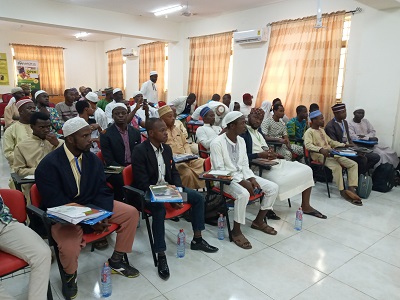A Non-Governmental Organisation (NGO), Muslim Peace Network, on Wednesday trained Arabic and Islamic teachers in Kaduna schools on preventing religious extremism.
The News Agency of Nigeria (NAN) reports that the one-day training, under the NGO’s ‘Community Initiatives to Promote Peace’ (CIPP), was sponsored by Cardinal Onaiyekan Foundation for Peace (COFP).
Speaking at the training in Kaduna, the Executive Director of the NGO, Imam. Hussain Makanjuola, said the training was aimed at peace building.
He said the reverse of peaceful co-oexistance most times as caused by religious extremism, is conceived by students in Arabic schools from the teachings of their teachers.
Defining religious extremism as ideologies and teachings that oppose fundamental values of the society, Makanjuola noted the importance of checkmating Arabic and Islamic teachers on what and how they teach their students regarding religion.
He lamented that religious extremism had generated so much violence resulting to damage and chaos in many societies in the state and Nation at large.
He noted that religious extremism would continue to be a problem in the society if all and sundry fail to wake up and take responsibility in ensuring their contributions in one way or the other in curbing it.
Makanjuola further said the training would ensure that teachers step it down to their students by inculcating peace into their hearts while associating and living with people of divergent religions in their various communities and schools.
He restated the importance of knowledge of peace in the hearts of students, especially youths, who he described as future leaders, to make the society violent free.
READ ALSO:
- EFCC Acted on Expired Watch-List in Arresting Okupe – EFCC
- Okupe Released; Claims Arrest Was in Error
- DSS Operatives Arrest Okupe, Obi’s Ex-Campaign DG
He called on the Government, through the appropriate agencies, to ensure Arabic and Islamic schools curriculum are in line with teachings devoid of selfish interest and hate for one another.
He also called for checkmating of preachers, to ensure that societies are free of toxic minds.
Also, Malam Abdulhakeem Sani, a board member of the NGO, said extremism is a very sensitive issue, which has social vices and economic impediments as attributes.
He said objective of training the teachers was to ensure they teach religion rightly to the students especially at their early ages so as they become what the society is desirable of.
One of the participants, Malam Imran Abdulkadir, an Arabic teacher at Darul Hikmah Madarasatul Islamiyya Wal Ijliziyya, said the training was in the right direction towards cushioning and minimising the rate of religious extremism in societies.
He stressed the importance of applying knowledge in curbing religious extremism, no matter how deep it had eaten into the society.
“We use knowledge to dismantle all the problems in the society, and that is why it is very important to hold such gatherings on at least monthly basis to keep reawakening our consciousness and the need for peace building and teachings”.
Abdulkadir said shying away from teachings which have iotas of extremism, Islamic and Arabic teachers must continue exploiting the knowledge in the fundamentals and basics of learning religion.
He said the fundamentals were embedded in Islamic books like ‘Ahdari’ (acts of worship) and ‘Tauheed’ (onness of God), among others.
“If one follows and reads these books carefully, it will be observed that they teach religion and oneness of Allah without any form of extremism,” he said.
According to him, most of the knowledge embedded in contemporary religious books were that of the authors themselves and not the real knowledge.
“We must go back to the teachings of the four ‘Sunni’ school of thoughts if we want to solve the problem of extremism,” Abdulkadir said.
Also, Malam Muhammad Khalid, the Principal of Ansarudeen Arabic and Islamic studies, said they were teaching their students in line with the curriculum provided to them by the State from the National Board for Arabic and Islamic Studies (NBAIS).
He said some of the books were imperfectly developed.
“Some of the topics on ‘Hadith’, ‘Fikhu’ and ‘Tauhid’, based on the curriculum, are not in the books we are using.
“We had to improvise by downloading it, just to ensure we are in line with pure teachings of the Prophet which of course had done away with all elements of extremism,” Khalid said.
He also called on the Government to ensure proper screening and checking of religions schools to avoid breeding of extremists which are counter peaceful and development to the society.


